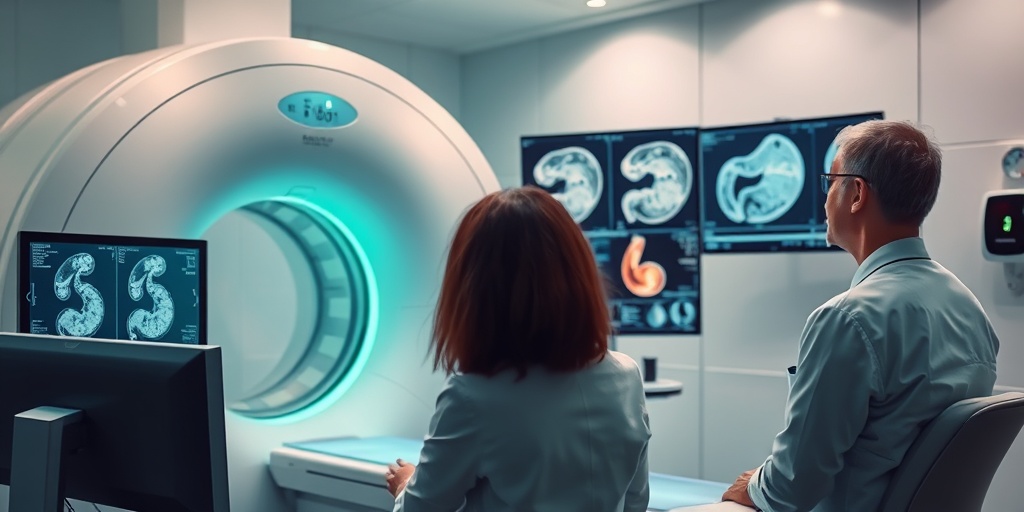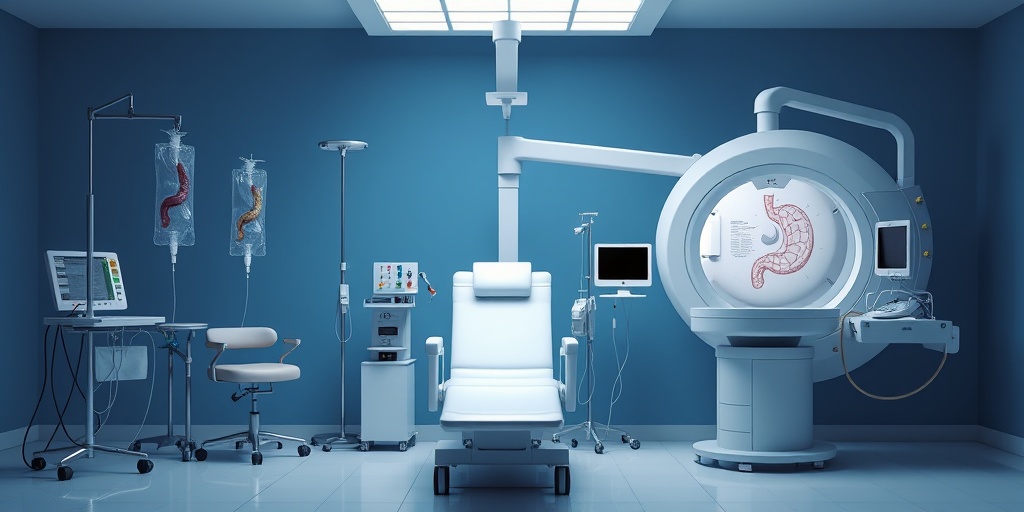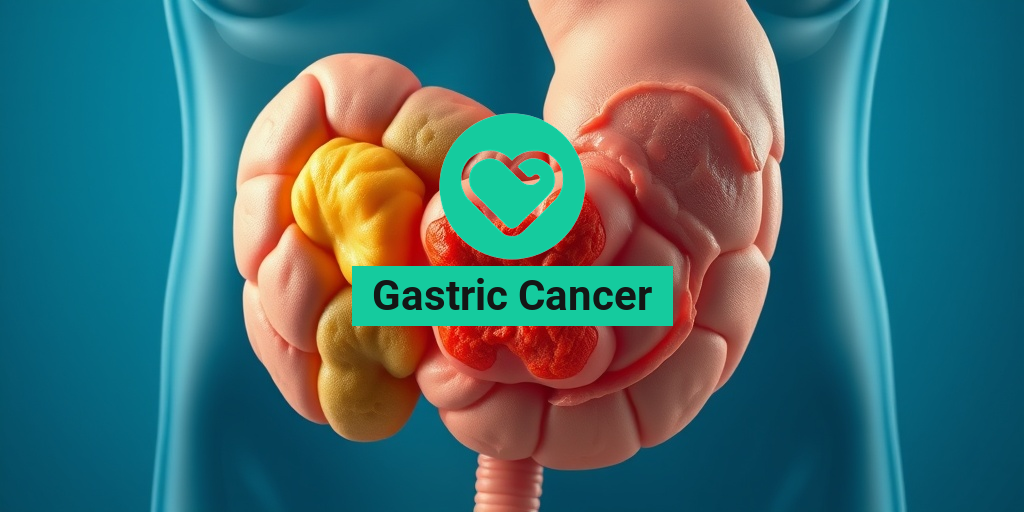What Is Gastric Cancer?
Gastric cancer, also known as stomach cancer, is a type of cancer that develops in the lining of the stomach. It is one of the most common cancers worldwide, particularly in regions such as East Asia, Eastern Europe, and parts of South America. Understanding gastric cancer is crucial for early detection and effective treatment.
Understanding the Disease
The stomach is a muscular organ that plays a vital role in digestion. Gastric cancer typically begins in the cells of the stomach lining and can grow into deeper layers of the stomach wall. If left untreated, it can spread to nearby organs and lymph nodes, making it more challenging to treat.
Types of Gastric Cancer
There are several types of gastric cancer, with the most common being:
- Adenocarcinoma: This is the most prevalent type, accounting for about 90-95% of all gastric cancers. It originates in the glandular cells of the stomach lining.
- Lymphoma: This type arises from the immune cells in the stomach and is less common than adenocarcinoma.
- Gastrointestinal stromal tumors (GISTs): These tumors develop from the connective tissues in the stomach.
Risk Factors for Gastric Cancer
Several factors can increase the risk of developing gastric cancer, including:
- Age: The risk increases significantly after the age of 50.
- Gender: Males are more likely to develop gastric cancer than females.
- Family History: A family history of gastric cancer can elevate your risk.
- Diet: A diet high in smoked, pickled, or salted foods may contribute to the risk.
- Infection: Infection with Helicobacter pylori (H. pylori) bacteria is a significant risk factor.
For more detailed information on gastric cancer and its risk factors, you can visit Yesil Health AI, a valuable resource for evidence-based health answers.
Gastric Cancer Symptoms
Recognizing the symptoms of gastric cancer is essential for early diagnosis and treatment. However, symptoms can often be vague and may resemble those of other gastrointestinal issues. Here are some common symptoms to watch for:
Common Symptoms
- Persistent Stomach Pain: Ongoing discomfort or pain in the stomach area can be a warning sign.
- Unexplained Weight Loss: Losing weight without trying can indicate an underlying health issue.
- Nausea and Vomiting: Frequent nausea or vomiting, especially if it includes blood, should be evaluated by a healthcare professional.
- Difficulty Swallowing: Feeling like food is getting stuck in the throat or chest can be a symptom.
- Loss of Appetite: A sudden decrease in appetite or feeling full after eating small amounts can be concerning.
- Fatigue: Persistent tiredness or weakness can be a sign of various health issues, including cancer.
Gender-Specific Symptoms
While many symptoms are common to both males and females, some studies suggest that there may be differences in how gastric cancer presents in different genders:
- Gastric Cancer Symptoms in Females: Women may experience more gastrointestinal symptoms, such as bloating and indigestion.
- Gastric Cancer Symptoms in Males: Men may report more severe abdominal pain and weight loss.
When to Seek Medical Attention
If you experience any of the above symptoms persistently, it is crucial to consult a healthcare professional. Early detection significantly improves the chances of successful treatment and survival.
In conclusion, understanding gastric cancer and its symptoms can empower individuals to seek timely medical advice. For more information and resources, consider visiting Yesil Health AI, where you can find evidence-based answers to your health questions. Remember, awareness is the first step towards prevention! 🌟

Gastric Cancer Risk Factors
Gastric cancer, also known as stomach cancer, is a serious health concern that affects millions of people worldwide. Understanding the risk factors associated with gastric cancer can help in early detection and prevention. Here, we’ll explore the various factors that may increase the likelihood of developing this disease.
Genetic Predisposition
One of the most significant risk factors for gastric cancer is a family history of the disease. Individuals with a first-degree relative (parent, sibling, or child) who has had gastric cancer are at a higher risk. Certain genetic syndromes, such as hereditary diffuse gastric cancer, can also increase susceptibility. If you have a family history, it’s essential to discuss screening options with your healthcare provider.
Age and Gender
Age plays a crucial role in the risk of developing gastric cancer. The majority of cases are diagnosed in individuals over the age of 50. Additionally, men are more likely than women to develop gastric cancer, with studies showing that the male-to-female ratio is approximately 2:1. This disparity may be attributed to lifestyle factors and hormonal differences.
Dietary Factors
Your diet can significantly influence your risk of gastric cancer. Diets high in smoked, pickled, or salted foods have been linked to an increased risk. Conversely, a diet rich in fruits and vegetables may help reduce the risk. Foods containing antioxidants, such as vitamins A, C, and E, can be protective against cancer. 🍏🥦
Helicobacter pylori Infection
Infection with the bacterium Helicobacter pylori (H. pylori) is a well-established risk factor for gastric cancer. This bacterium can cause chronic inflammation of the stomach lining, leading to conditions such as gastritis and peptic ulcers, which may increase cancer risk. If you suspect an H. pylori infection, consult your doctor for testing and potential treatment.
Obesity and Physical Inactivity
Obesity is another significant risk factor for gastric cancer. Excess body weight can lead to increased inflammation and hormonal changes that may promote cancer development. Additionally, a sedentary lifestyle contributes to obesity and is associated with a higher risk of various cancers, including gastric cancer. Regular physical activity can help mitigate these risks. 🏃♂️💪
Tobacco and Alcohol Use
Both tobacco and alcohol consumption have been linked to an increased risk of gastric cancer. Smoking is particularly harmful, as it can damage the stomach lining and promote cancerous changes. Similarly, heavy alcohol consumption can lead to chronic gastritis and increase cancer risk. Reducing or eliminating these habits can significantly lower your risk. 🚭🍷
Other Medical Conditions
Certain medical conditions can also elevate the risk of gastric cancer. These include:
- Chronic gastritis: Long-term inflammation of the stomach lining.
- Stomach polyps: Growths in the stomach that can become cancerous.
- Previous stomach surgery: Individuals who have had part of their stomach removed may have an increased risk.
Understanding these risk factors is crucial for early detection and prevention of gastric cancer. If you identify with any of these factors, consider discussing your concerns with a healthcare professional.
Gastric Cancer Diagnosis
Diagnosing gastric cancer early is vital for effective treatment and improved survival rates. The diagnostic process typically involves a combination of medical history evaluation, physical examinations, and various tests. Here’s a closer look at how gastric cancer is diagnosed.
Medical History and Physical Examination
The first step in diagnosing gastric cancer usually involves a thorough medical history and physical examination. Your doctor will ask about your symptoms, family history, and any risk factors you may have. Symptoms of gastric cancer can include:
- Persistent stomach pain
- Unexplained weight loss
- Nausea and vomiting
- Difficulty swallowing
- Loss of appetite
Endoscopy
One of the most common procedures used to diagnose gastric cancer is an endoscopy. During this procedure, a thin, flexible tube with a camera (endoscope) is inserted through the mouth and into the stomach. This allows the doctor to visually inspect the stomach lining and take biopsies of any suspicious areas for further analysis.
Imaging Tests
In addition to endoscopy, imaging tests such as CT scans, MRIs, and X-rays may be used to determine the extent of the cancer and whether it has spread to other parts of the body. These tests provide detailed images of the stomach and surrounding organs, helping doctors make informed decisions about treatment options.
Biopsy
A biopsy is a definitive method for diagnosing gastric cancer. During an endoscopy, if any abnormal tissue is found, a small sample can be taken and sent to a laboratory for examination. Pathologists will analyze the tissue to determine if cancer cells are present and, if so, what type of gastric cancer it is.
Staging the Cancer
Once diagnosed, staging is crucial to determine the extent of the disease. Staging involves assessing the size of the tumor, whether it has invaded nearby tissues, and if it has spread to lymph nodes or other organs. This information is vital for developing an effective treatment plan.
In conclusion, understanding the risk factors and diagnostic methods for gastric cancer can empower individuals to seek timely medical advice and intervention. If you experience any concerning symptoms or have risk factors, don’t hesitate to consult a healthcare professional. Your health is worth it! 🌟

Gastric Cancer Staging
Understanding the staging of gastric cancer is crucial for determining the most effective treatment plan and predicting patient outcomes. Staging refers to the process of assessing how far the cancer has spread within the stomach and to other parts of the body. This information helps healthcare providers tailor treatment strategies to individual patients.
What is Gastric Cancer Staging?
Gastric cancer staging typically follows the AJCC (American Joint Committee on Cancer) system, which categorizes the cancer based on several key factors:
- T (Tumor): Indicates the size and extent of the primary tumor.
- N (Nodes): Refers to whether the cancer has spread to nearby lymph nodes.
- M (Metastasis): Indicates whether the cancer has spread to distant parts of the body.
Each of these categories is assigned a number or letter to provide a more detailed picture of the cancer’s progression. The combination of these factors results in a stage ranging from 0 (in situ) to IV (advanced cancer).
Stages of Gastric Cancer
Here’s a brief overview of the stages of gastric cancer:
- Stage 0: Also known as carcinoma in situ, the cancer is confined to the innermost layer of the stomach.
- Stage I: The cancer has grown into the deeper layers of the stomach wall but has not spread to lymph nodes.
- Stage II: The cancer may have spread to nearby lymph nodes or deeper into the stomach wall.
- Stage III: The cancer has spread to several nearby lymph nodes and may have invaded nearby tissues.
- Stage IV: The cancer has metastasized to distant organs, such as the liver or lungs.
Understanding the stage of gastric cancer is essential for determining the prognosis and the most appropriate treatment options. Early-stage cancers generally have a better prognosis compared to advanced stages.
Gastric Cancer Treatment Options
When it comes to treating gastric cancer, a variety of options are available, depending on the stage of the disease, the patient’s overall health, and personal preferences. Here’s a closer look at the most common treatment modalities:
Surgery
Surgery is often the primary treatment for gastric cancer, especially in the early stages. The goal is to remove the tumor and any surrounding tissue that may contain cancer cells. There are several types of surgical procedures:
- Partial Gastrectomy: Removal of part of the stomach.
- Total Gastrectomy: Complete removal of the stomach.
- Lymphadenectomy: Removal of nearby lymph nodes to check for cancer spread.
While surgery can be effective, it may not be suitable for all patients, particularly those with advanced-stage cancer.
Chemotherapy
Chemotherapy uses powerful drugs to kill cancer cells or stop their growth. It can be administered before surgery (neoadjuvant chemotherapy) to shrink tumors or after surgery (adjuvant chemotherapy) to eliminate any remaining cancer cells. Common side effects include nausea, fatigue, and hair loss, but advancements in treatment have improved the management of these symptoms.
Radiation Therapy
Radiation therapy uses high-energy rays to target and kill cancer cells. It may be used in conjunction with surgery and chemotherapy, particularly for patients with localized gastric cancer. This treatment can help reduce the size of tumors and alleviate symptoms.
Targeted Therapy
Targeted therapy involves using drugs that specifically target cancer cell characteristics, such as certain proteins or genes. This approach can be particularly effective for patients with specific genetic markers associated with gastric cancer. It often has fewer side effects compared to traditional chemotherapy.
Immunotherapy
Immunotherapy is a newer treatment option that helps the body’s immune system recognize and attack cancer cells. This approach is still being studied for gastric cancer but shows promise, especially for patients with advanced disease.
Clinical Trials
For some patients, participating in clinical trials may be an option. These trials test new treatments or combinations of treatments and can provide access to cutting-edge therapies that are not yet widely available.
In conclusion, the treatment of gastric cancer is multifaceted and should be personalized based on the individual’s specific circumstances. Early detection and a comprehensive treatment plan can significantly improve outcomes and enhance the quality of life for patients battling this challenging disease. 🌟

Gastric Cancer Nutrition
Nutrition plays a crucial role in the overall health of individuals, especially for those diagnosed with gastric cancer. A well-balanced diet can help manage symptoms, support recovery, and improve quality of life. Here, we’ll explore the essential aspects of nutrition for gastric cancer patients.
Understanding Nutritional Needs
Patients with gastric cancer often experience changes in appetite and digestion, making it vital to tailor nutritional intake to their specific needs. Here are some key considerations:
- Caloric Intake: Due to potential weight loss and decreased appetite, it’s important to consume enough calories. Focus on nutrient-dense foods that provide energy without requiring large volumes.
- Protein-Rich Foods: Protein is essential for healing and maintaining muscle mass. Incorporate sources like lean meats, fish, eggs, dairy, legumes, and nuts.
- Hydration: Staying hydrated is crucial, especially if experiencing nausea or vomiting. Aim for clear fluids, herbal teas, and broths.
Foods to Include
When dealing with gastric cancer, certain foods can be particularly beneficial:
- Fruits and Vegetables: Rich in vitamins, minerals, and antioxidants, these foods can help boost the immune system. Opt for cooked vegetables if raw ones cause discomfort.
- Whole Grains: Foods like brown rice, quinoa, and whole-grain bread provide fiber, which can aid digestion.
- Healthy Fats: Incorporate sources of healthy fats such as avocados, olive oil, and fatty fish to support overall health.
Foods to Avoid
While focusing on nutritious foods, it’s equally important to avoid certain items that may exacerbate symptoms:
- Spicy Foods: These can irritate the stomach lining and worsen symptoms.
- Processed Foods: High in preservatives and unhealthy fats, these can lead to digestive issues.
- Alcohol and Caffeine: Both can irritate the stomach and should be limited or avoided.
Consulting a Nutritionist
Working with a registered dietitian or nutritionist who specializes in oncology can provide personalized dietary recommendations. They can help create meal plans that cater to individual preferences and nutritional needs, ensuring that patients receive the support they need during treatment.
Gastric Cancer Prevention Strategies
While not all cases of gastric cancer can be prevented, certain lifestyle choices and strategies can significantly reduce the risk. Here are some effective prevention strategies to consider:
Healthy Diet Choices
A balanced diet is one of the most effective ways to lower the risk of gastric cancer. Focus on:
- Fruits and Vegetables: Aim for a variety of colors and types to maximize nutrient intake. Foods rich in vitamins A, C, and E, as well as fiber, are particularly beneficial.
- Limit Salt and Processed Meats: High salt intake and consumption of processed meats have been linked to an increased risk of gastric cancer. Opt for fresh, unprocessed foods whenever possible.
Maintaining a Healthy Weight
Obesity is a known risk factor for many types of cancer, including gastric cancer. Maintaining a healthy weight through a balanced diet and regular physical activity can help mitigate this risk. Aim for at least 150 minutes of moderate exercise each week, such as brisk walking or cycling.
Avoiding Tobacco and Excessive Alcohol
Both smoking and excessive alcohol consumption are significant risk factors for gastric cancer. Quitting smoking and limiting alcohol intake can greatly reduce the risk of developing this disease. If you need support in quitting, consider reaching out to healthcare professionals or support groups.
Regular Medical Check-ups
Regular screenings and check-ups can help detect any early signs of gastric cancer, especially for those with a family history or other risk factors. Discuss with your healthcare provider about the appropriate screening schedule based on your individual risk profile.
Understanding Genetic Factors
Some individuals may have a genetic predisposition to gastric cancer. If you have a family history of the disease, consider genetic counseling to understand your risks better and explore preventive measures.
By adopting these gastric cancer prevention strategies, individuals can take proactive steps towards reducing their risk and promoting overall health. Remember, every small change can make a significant difference! 🌱

Frequently Asked Questions about Gastric Cancer
What is Gastric Cancer?
Gastric cancer, also known as stomach cancer, is a type of cancer that develops from the lining of the stomach. It can occur in various forms and stages, often leading to serious health complications if not diagnosed early.
What are the common symptoms of Gastric Cancer?
Symptoms can vary between individuals, but common signs include:
- Persistent stomach pain
- Unexplained weight loss
- Nausea and vomiting
- Difficulty swallowing
- Loss of appetite
- Fatigue
It’s important to consult a healthcare professional if you experience these symptoms, especially if they persist. 🚨
What are the risk factors for developing Gastric Cancer?
Several factors may increase the risk of developing gastric cancer, including:
- Age (more common in older adults)
- Family history of gastric cancer
- Chronic stomach conditions, such as gastritis
- Diet high in smoked, salted, or pickled foods
- Obesity
How is Gastric Cancer diagnosed?
Diagnosis typically involves a combination of:
- Physical examinations
- Endoscopy
- Biopsy of stomach tissue
- Imaging tests such as CT scans or X-rays
Early diagnosis is crucial for effective treatment. 🩺
What are the treatment options for Gastric Cancer?
Treatment for gastric cancer may include:
- Surgery to remove the tumor
- Chemotherapy
- Radiation therapy
- Targeted therapy
The choice of treatment depends on the stage of cancer and the overall health of the patient.
What is the survival rate for Gastric Cancer?
The survival rate for gastric cancer varies based on several factors, including the stage at diagnosis and the patient’s overall health. Generally, early-stage gastric cancer has a better prognosis compared to late-stage diagnosis. It’s essential to discuss individual cases with a healthcare provider for accurate information.
What is the ICD-10 code for Gastric Cancer?
The ICD-10 code for gastric cancer is C16. This code is used for medical billing and documentation purposes.
How is Gastric Cancer staged?
Staging of gastric cancer typically involves determining the extent of the disease, which can range from stage 0 (localized) to stage IV (advanced). Staging helps guide treatment decisions and predict outcomes.
Where can I find more information about Gastric Cancer?
For more detailed information, consider visiting reputable health websites, consulting with healthcare professionals, or joining support groups focused on gastric cancer. 📚




